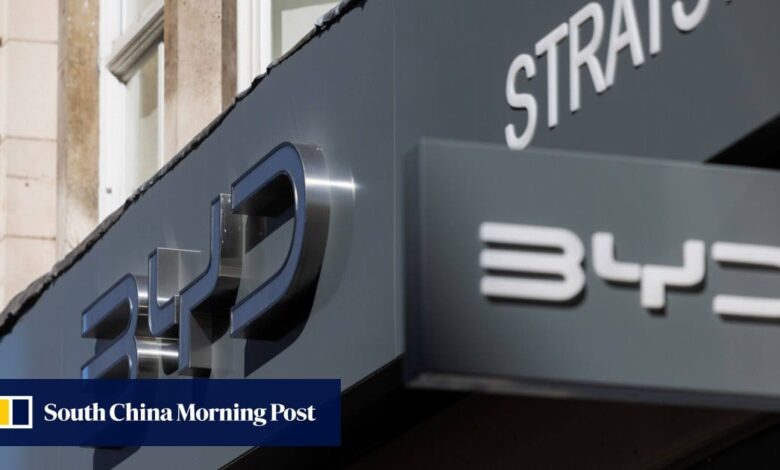BYD’s third-quarter profit soars to record after beating Tesla and others in EV deliveries, capping costs

The Shenzhen-based company, which is backed by Warren Buffett’s Berkshire Hathaway, said in a filing to both the Shenzhen and Hong Kong stock exchanges, that net income between July and September stood at 10.4 billion yuan (US$1.4 billion), which is in the middle of the company’s forecast range of 9.55 billion yuan to 11.55 billion yuan. It beat the previous record earnings of 7.3 billion yuan posted in the fourth quarter of 2022.
BYD’s third-quarter profit translates into an 82.2 per cent jump from the same period a year ago and a 53 per cent quarter on quarter increase. Revenue in the third quarter climbed 36.5 per cent on year to 162.2 billion yuan.
The company said in an exchange filing on October 17, when it made a forecast of its third-quarter earnings, that it expected a record profit on the back of improving brand influence and strong industrial chain-wide cost-control.
China’s BYD eyes lithium assets in Brazil in EV raw-material push
China’s BYD eyes lithium assets in Brazil in EV raw-material push
On the mainland, BYD’s mass market vehicles are well received by middle-class consumers as they are viewed as value-for-money products.
Most BYD models are priced in the 100,000 yuan to 200,000 yuan range, a bargain compared with Tesla and other competitors such as Nio and Li Auto, whose technology-packed models sell for more than 300,000 yuan each.
“BYD is the top winner of China’s fast-growing EV market,” said Chen Jinzhu, CEO of consultancy Shanghai Mingliang Auto Service. “Its sales rise while the company manages to control costs effectively amid a higher production volume thanks to its unique supply chain.”
BYD owns the entire supply chain of EV batteries, from the raw materials to the finished battery packs that go into their cars, giving it greater control over costs, profit margin and deliveries. It also runs its own energy storage division and designs the semiconductor chips it uses in-house.
In Europe, the Seal has a sustainable 25 per cent cost advantage over rivals, even after factoring in the higher tariffs which resulted from growing trade barriers, the report said.
The Swiss bank forecast that Chinese-made cars, benefiting from a faster pace of electrification in the world’s largest automotive and EV market, will control 33 per cent of the global market by 2030, up from 17 per cent last year.
UBS analyst Paul Gong singled out BYD in September as the Chinese carmaker best at extending its reach beyond the mainland. Currently, most of BYD’s cars are delivered to mainland customers, but it has recently accelerated its global expansion plans.





